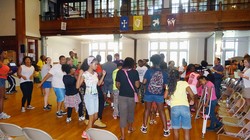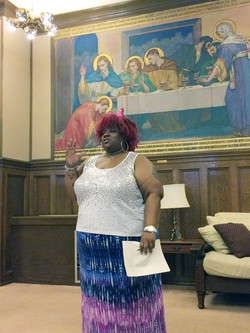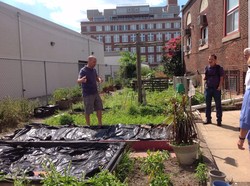The Executive Committee of the Presbyterian Mission Agency Board (PMAB) of the Presbyterian Church (U.S.A.) met for its annual retreat at the offices of the Presbytery of Philadelphia (Pa.), July 22-24. In addition to business items addressed, the committee participated in four site visits, learning more about ministry initiatives in the Philadelphia area.
The first reported action of the committee was a response to a request for the use of the chapel at the Presbyterian Center in Louisville to conduct a same-gender marriage. The committee approved the request, saying its use was “consistent with the center’s chapel and building use policy, for any couple bearing a lawfully issued marriage license.”
Since the PC(USA) moved its headquarters to Louisville in 1987 at least eight couples have been married at the Presbyterian Center. Seven of those marriage ceremonies took place in the chapel, which completed construction in 1995.
This authorization follows a resolution approved by the 221st General Assembly in 2014, and adopted by a vote of the presbyteries in early 2015, allowing same-gender marriages in Presbyterian contexts and also with last month’s Supreme Court ruling removing restrictions on same-gender marriages nation-wide.
In a second action, the committee appointed Glen Snider as the replacement for Marci Glass on the Ghost Ranch Governing Board from June 1, 2015 to May 31, 2016. Glass requested the temporary substitution based on other commitments and will resume her role on the governing board June 1, 2016.
Discussion on the future of the Presbyterian Mission Agency led Marilyn Gamm, PMAB chair, to appoint a task force to consider options for a churchwide conversation on the mission, priorities and structures of the PMA. Members of the task force are Mihee Kim-Kort, Jo Stewart and Kevin Yoho. They will, in consultation with the Office of the General Assembly Strategy Working Group, deliver a preliminary report on recommendations for this process to the September board meeting.
The committee also discussed the importance for cultural proficiency and humility training. Common agreement was shared about the importance of such training: the need for training that is sensitive to the history and culture of the PC(USA), and an intention to provide the training annually if possible. Members of the committee agreed to work with the Rev. Dr. Rhashell Hunter, director of Racial Ethnic and Women’s Ministries, to coordinate a training during the September 2015 PMAB meeting.
Executive Committee members visited four Presbyterian ministries in the Philadelphia area the morning of July 23. First Presbyterian Church Germantown, Freedom School; The Common Place; Beacon new church development; and Christ’s Presbyterian Church were lifted up as examples of innovation and mission excellence.

Freedom School children begin their day with motivational song and Harambee celebration. —Greg Klimovitz
The Freedom School at First Presbyterian Church Germantown has served Germantown children since 2011, helping create an enthusiasm for learning and reading. During the seven-week summer program, participating children read a total of 56 books, all with a theme of “I can make a difference.” As part of their program, the 50 students build a library of books they are able to take home with them. Core activities of Bible study, assemblies, arts and crafts, dance, music, field trips, and swimming occupy their days, which start at 8:00 am and continue until 3:00 pm.
The Common Place, a ministry partnership between Wayne Presbyterian Church and New Spirit Community Church, was birthed in 2013 and operates as a hub of educational, art, and faith for youth in Southwest Philadelphia.
Wayne Presbyterian bought the building from the Presbytery of Philadelphia for $1.00—allowing them to transform the space into a faith-based, educational outreach and community center. This site continues to be a worship space for New Spirit Community Church, while now also serving as an annex space to Cornerstone Christian Academy—a school started by Rev. Tony Campolo from Eastern University.

Ruling Elder and Program Director of The Freedom School, Contina Lundy, shares its vision for ministry alongside children in Germantown. —Greg Klimovitz
Beacon new church development, part of the 1001 New Worshipping Communities initiative, was founded in 2012 with the expressed mission to invite people into their space by engaging the arts. As part of this commitment, they offer year-round art programs for children and youth, with an after-school program runs Monday, Tuesday and Wednesday during the school year, and Tuesday and Thursday during the summer.
Serving a disenfranchised working class community, Beacon has become a faith community, meeting weekly for worship on Sundays at 5:00 p.m., offering a free communal meal following worship the first Sunday of every month. The community has also become a “Mission Lab,” offering day-long retreats and mission work opportunities to interested groups. Another ministry birthed out of its identity is the Studio Volunteer Corps, where youth are trained in job skills and nonprofit basics.
Christ’s Presbyterian Church, founded in 1899 and located near Philadelphia Italian Market, continues to be a hub for new immigrant arrivals. Once a place of welcome to Italian immigrants, today this South Philadelphia neighborhood also embraces new arrivals from Asia.
One of Christ’s ministries, their summer program known as ‘Abundant Life Camp,’ is a joint ecumenical effort bringing together more than six small churches and about 100 children. The presence of this ecumenical partnership provides a welcoming place for the “stranger” in their community and allows for church and spiritual growth through teaching, evangelism and discipleship.
The 35-member congregation continues to seek out creative ways to be a relevant presence to new arrivals to the U.S., many whom come from other faith and religious traditions.

The Rev. David Sanchez, pastor of Christ's Presbyterian Church, shares about its urban gardens and various children's ministry in a multicultural community. —Greg Klimovitz
Speaking on the importance of the Executive Committee presence in the Presbyterian of Philadelphia, Executive Presbyter the Rev. Ruth F. Santana-Grace, expressed thanks for the visit by representatives of the PC(USA) and to their experience at the site visits.
“The temptation is to go where the glitz is, where the huge ministries exist,” she said. “We were glad these sites let us show the faithfulness of people working in their communities.”
“At a time when many lament the decline of the church, I believe it is time to look outside ourselves and identify where signs of resurrection hope are to be found,” Santana-Grace said of the four sites selected as examples of dynamic ministry in Philadelphia. “It is on the edge of those places—between the known and the unknown—that we are called to find and be a vibrant and relevant witness to the gospel of Jesus Christ.”
